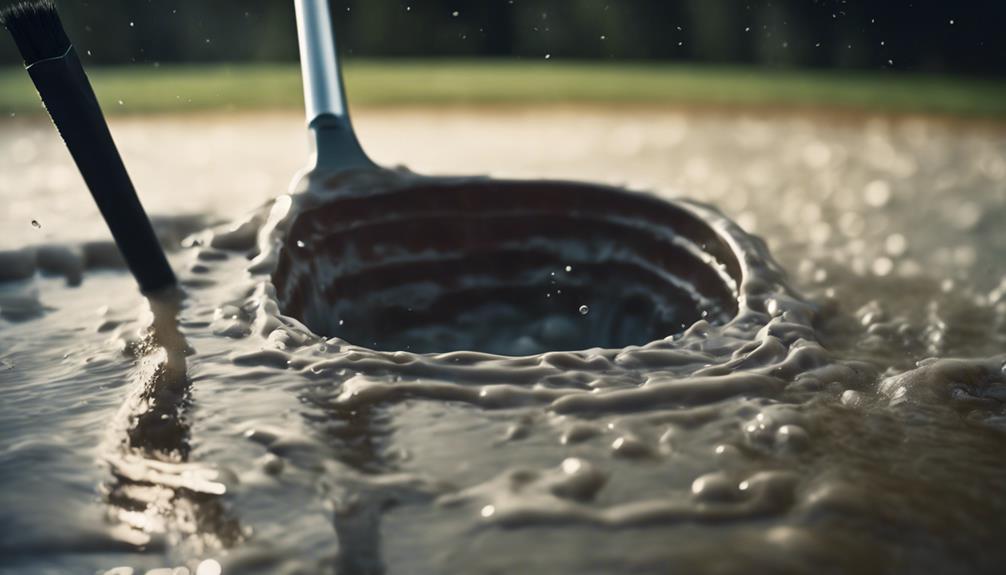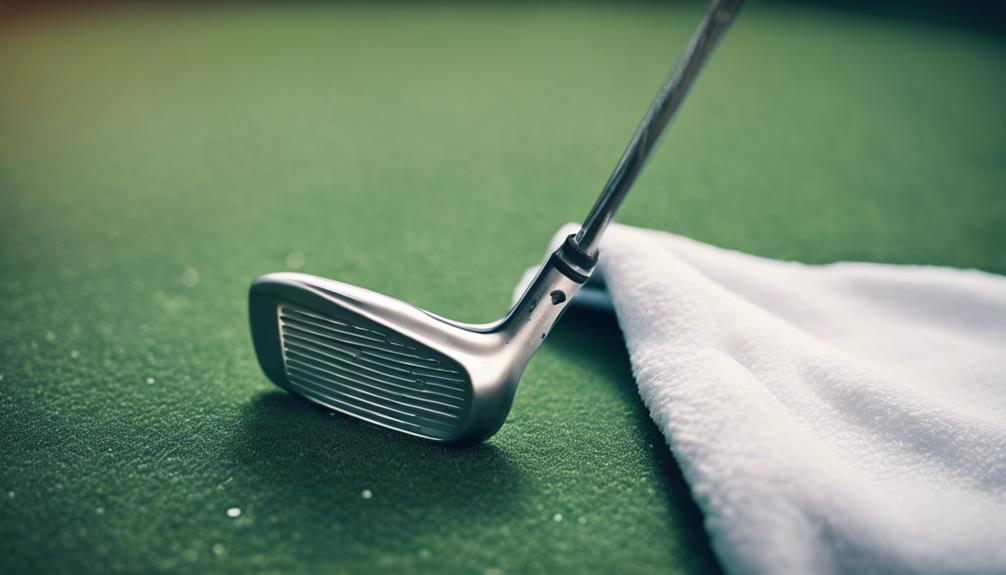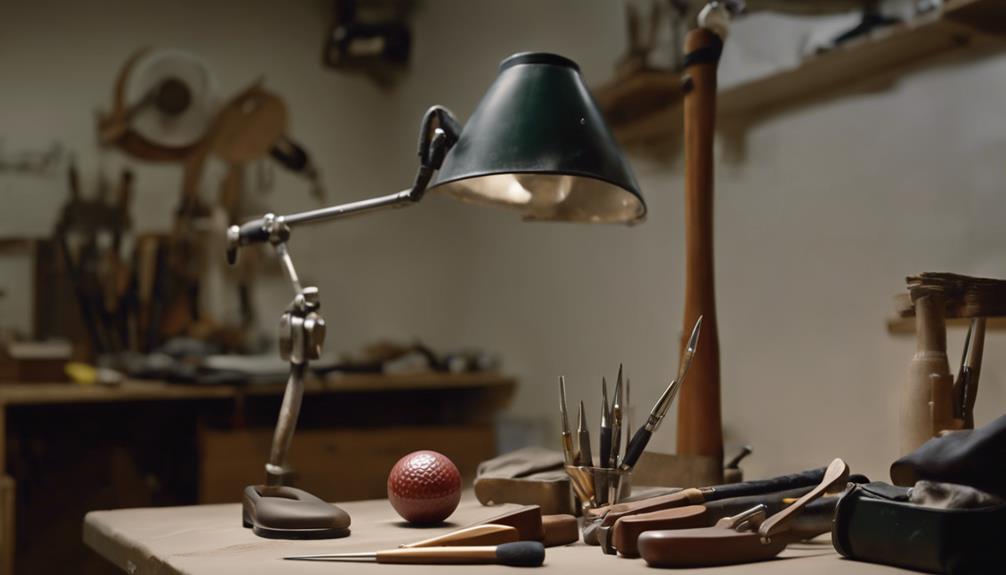- 7 Top Flite Golf Clubs XL for Improved Performance - September 28, 2024
- Top Flite Golf Clubs: Top 5 Reasons to Choose Them - September 28, 2024
- Top 3 Golf Club Fitters for a Perfect Swing - September 28, 2024
You're well on your way to cleaning your golf clubs like a pro by following these 7 essential steps. First, gather your cleaning arsenal, including a bucket, mild dish soap, soft-bristled brush, and microfiber towel. Next, soak your club heads in warm soapy water to loosen dirt and debris. Then, scrub away the grime using your soft-bristled brush and gently clean out the grooves with a soft toothbrush. Rinse thoroughly with clean water, dry completely to prevent rust, and clean your grips and shafts using a mild soap and soft-bristled brush. Finally, inspect your clubs for damage and store them properly to maintain their performance and extend their lifespan. By mastering these steps, you'll be prepared to tackle even the toughest cleaning tasks ahead.
Key Takeaways
- Gather necessary cleaning supplies, including a bucket, mild dish soap, soft-bristled brush, and microfiber towel to clean golf clubs effectively.
- Soak club heads in warm soapy water for 2-3 minutes to loosen dirt and debris, making it easier to clean grooves and crevices.
- Use a soft-bristled brush to gently scrub away dirt and debris from the club face, and a soft toothbrush to clean out grooves.
- Immediately rinse golf clubs with clean water to prevent soap residue from drying on the surface, and dry completely to prevent rust.
- Inspect clubs for signs of wear, such as scratches, dents, or rust spots, and store them properly in a well-maintained golf bag to keep them in top condition.
Gather Essential Cleaning Supplies
Gather all the necessary tools in your cleaning arsenal by collecting a bucket, warm water, mild dish soap, a soft-bristled brush, and a microfiber towel.
These essential cleaning supplies will help you clean your golf clubs like a pro. The bucket will serve as a container for your soapy water, while the warm water will help loosen dirt and debris. Mild dish soap is a gentle yet effective cleaning agent that won't leave residue on your clubs.
A soft-bristled brush is necessary for scrubbing away dirt and debris from club grooves without scratching the club face. Finally, a microfiber towel is ideal for drying your clubs as it's gentle on the finish and can absorb moisture effectively.
Having all these supplies at your disposal will guarantee you're well-equipped to tackle even the toughest cleaning tasks. A dedicated cleaning kit or bucket can also help keep all your cleaning supplies organized and within reach.
Soak Club Heads in Soapy Water
Precision is key when cleaning your golf clubs, and soaking the club heads in soapy water is a crucial step in removing dirt and debris that can affect their performance.
To do this effectively, fill a bucket with warm soapy water – not hot, as this can damage the club heads, and not cold, as it won't effectively loosen the dirt.
You'll want to use a mild dish soap, as harsh chemicals can damage the club heads or leave residues that affect performance.
Submerge the club heads in the soapy water for 2-3 minutes, allowing the soap to penetrate and lift away dirt and grime.
This soaking process will help loosen dirt and debris, making it easier to clean the grooves and crevices.
Remember, the goal is to loosen the dirt, not to scrub it away at this stage.
Scrub Away Dirt and Debris

Scrubbing away dirt and debris from the club face is a delicate process that requires the right tools and techniques to avoid damaging the club's surface.
You'll need a soft-bristled brush, specifically designed for cleaning golf clubs, to gently scrub away dirt and debris.
For irons and wedges, soak them in a solution of warm water and dish soap for a few minutes to loosen stubborn dirt and debris before scrubbing.
Then, use a soft toothbrush to clean out the grooves, as its small bristles can reach into tight spaces.
When scrubbing the club face, use a gentle circular motion to prevent scratching the surface.
Avoid using wire brushes or other abrasive materials, as they can scratch the club face and cause damage.
Instead, focus on cleaning the grooves and club face with a gentle, yet effective, scrubbing motion.
Rinse Thoroughly With Clean Water
After scrubbing away the dirt and debris, immediately rinse your golf clubs with clean water to prevent any soap residue from drying on the surface.
You want to remove all soap residue to guarantee your clubs don't attract dirt and dust, making them harder to clean in the future.
Rinse them thoroughly, making sure to get into all the grooves and crevices.
This step is essential in cleaning your golf clubs, as any remaining soap can affect the club's performance and overall lifespan.
Remember, cleaning your golf clubs after every use is essential to maintaining their quality and extending their lifespan.
When you rinse your clubs, make sure the water is clean and free of debris to prevent re-depositing dirt onto the surface.
By rinsing your clubs thoroughly, you're safeguarding they remain in top condition, ready for your next game.
Don't skip this step, as it's imperative in keeping your clubs clean and performing at their best.
Dry Clubs Completely to Prevent Rust

Now that your golf clubs are free of soap residue, you'll want to dry them completely to prevent rust from forming.
Grab a dry towel, preferably a golf towel, and gently pat the club heads dry. Make sure to remove any excess moisture, as it can seep into the club head and cause damage.
Don't be tempted to use a damp cloth, as it can spread moisture around, and definitely avoid using the same towel you used to wipe away the cleaning solution. Instead, use a fresh, dry towel to absorb any remaining moisture.
Take your clubs away from any humid environments and dry them in a well-ventilated area to prevent moisture buildup. After drying, inspect the club heads for any remaining water spots or moisture, and re-dry if necessary.
Regularly drying your clubs after cleaning can help maintain their condition and prolong their lifespan. By following these steps, you'll be able to keep your clubs rust-free and in top condition, ensuring they perform at their best on the course.
Clean Golf Club Grips and Shafts
When you're cleaning your golf clubs, you'll want to pay special attention to the grips and shafts, as these areas are prone to dirt and oil buildup.
To get started, you'll need to know the essentials of grip cleaning, including how to remove dirt and oils without damaging the grip material.
Grip Cleaning Essentials
You'll need a few simple tools to effectively clean your golf club grips and shafts, including mild soap, warm water, and a soft-bristled brush.
Make sure to choose a cleaning brush with soft bristles to avoid damaging your golf club grips. Dip the brush in warm soapy water, and gently scrub the grip, working from the top down. Focus on the areas with heavy dirt buildup, but avoid applying too much pressure, which can cause damage.
After scrubbing, use a microfiber cloth to wipe away dirt and soap residue. Repeat the process until your grip is clean and free of dirt.
For a more thorough grip cleaning, mix a solution of mild soap and warm water in a bowl.
Soak the grip in the solution for about 10 minutes. Then, use your cleaning brush to scrub away dirt and grime.
Rinse the grip with warm water, and dry it with a microfiber cloth.
A clean golf club grip is essential for a consistent swing, so make sure to clean your grips regularly to prevent dirt and grime from building up.
Shaft Inspection Tips
Inspect your golf club shafts regularly to catch signs of rust, corrosion, or damage early, and take prompt action to clean and address any issues you find. This proactive approach will help prevent damage and prolong the lifespan of your shafts.
| Shaft Inspection Tips | Action Items |
|---|---|
| Look for rust, corrosion, or damage | Clean with a damp cloth and inspect for loose ferrules |
| Remove rust from shafts | Use a vinegar and water mixture with a soft-bristled brush |
| Dry shafts thoroughly | Use a clean towel to prevent moisture buildup |
| Inspect ferrules | Consider replacing loose or damaged ferrules for peak performance |
When you notice rust, corrosion, or damage, take immediate action to clean and address the issue. Use a mixture of vinegar and water to gently scrub the affected area with a soft-bristled brush. After cleaning, dry the shaft thoroughly with a clean towel to prevent moisture buildup and rust. Don't forget to inspect the ferrules for any signs of wear or damage, and consider replacing them if necessary. By following these shaft inspection tips, you'll be able to maintain your golf clubs like a pro and promote top-notch performance on the course.
Effective Grip Drying
Drying your golf club grips thoroughly after cleaning is essential to preventing moisture buildup, which can lead to slippery grips and compromise your game. You can't afford to neglect this vital step, as it directly impacts your performance on the course.
To verify your clubs are dry and ready for action, follow these steps:
- Use a microfiber cloth: Gently wipe down each grip, making sure to remove any dirt and debris that may have accumulated during cleaning.
- Wipe in a circular motion: This helps to prevent streaks and guarantees a thorough dry.
- Leave them in the sun to dry: Direct sunlight can work wonders in evaporating any remaining moisture. Just be sure to check on them periodically to avoid overheating.
- Double-check for moisture: Before storing your clubs, give the grips a once-over to make sure they're completely dry. You don't want any moisture seeping into the grip material and causing damage.
Inspect Clubs for Damage and Storage

When you're done cleaning your golf clubs, you'll want to inspect them for damage to verify they're in good condition.
You're looking for signs of wear, such as scratches, dents, or rust spots, which can affect their performance.
Clubs in Poor Condition
Before you start cleaning your golf clubs, take a closer look at each one to identify any damage that may require special attention. Clubs in poor condition can be a major hindrance to your game, and ignoring the damage can lead to further deterioration.
- Cracks and dents: Inspect the clubheads, shafts, and grips for any signs of damage that may affect performance.
- Loose ferrules: Check if the ferrules are securely attached to the shaft to prevent damage during cleaning.
- Rust and corrosion: Identify any areas with rust or corrosion, which can weaken the club's structure.
- Improper storage: Consider how you've been storing your clubs and make adjustments to prevent moisture buildup and damage.
Check for Rust Spots
As you meticulously examine each club, pay particular attention to rust spots, those insidious imperfections that can quietly sabotage your game by weakening the club's structure and spreading rapidly if left unchecked.
Rust spots can appear on the clubheads, shafts, and ferrules, so inspect each area carefully. Look for any signs of damage, such as cracks, dents, scratches, or loose ferrules, which can affect the club's performance and longevity.
Regular cleaning and drying are essential in preventing rust spots from forming. Consider using a rust-inhibiting product or club cleaning solution to help protect your clubs from rust and corrosion.
When inspecting your clubs, don't just focus on the obvious areas – check the crevices and grooves where dirt and moisture can accumulate. By catching rust spots early, you can prevent them from spreading and causing further damage.
Proper Storage Methods
By storing your golf clubs properly, you'll prevent damage, maintain their performance, and extend their lifespan. After every round, take the time to inspect your clubs for damage and store them the right way.
A well-maintained golf bag is essential for keeping your clubs in top condition.
Clean and dry your clubs: Make sure to properly clean your clubs after every round to prevent dirt and grime from building up. This will help prevent rust and corrosion.
Store them upright: Keep your clubs standing upright in your golf bag to prevent them from getting bent or damaged.
Avoid overcrowding: Don't overcrowd your golf bag, as this can cause clubs to rub against each other and get damaged.
Keep them away from extreme temperatures: Avoid storing your golf clubs in extreme temperatures, such as in a hot car trunk or in freezing cold temperatures.
Frequently Asked Questions
What Is the Best Way to Clean Your Golf Clubs?
When cleaning your golf club, you'll achieve gentle cleaning by using soft brushes to scrub the club head, then rinsing with a soap solution and fresh water to remove dirt and debris without damaging the club.
Does WD40 Clean Golf Clubs?
Don't fall for golf myths, you're smarter than that! WD40 benefits include rust prevention and metal protection, but it's not ideal for club maintenance; instead, opt for a gentle spray alternative that won't leave residue.
How to Make Golf Clubs Shine Again?
To make your golf clubs shine again, you'll need a shine restorer like Club Polish, paired with gentle metal buffing and rust remover; then, follow up with grip cleaning and sparkle secrets to reveal a showroom finish.
Can You Use Dawn Dish Soap to Clean Golf Clubs?
"Soothing surfactants swoop in as you wonder, can you use Dawn dish soap to clean golf clubs? Yes, but be cautious: soap sensitivity varies among clubs, so test compatibility first, leveraging gentle foaming action for effective grease removal without compromising club integrity."
Conclusion
You've now mastered the art of cleaning your golf clubs like a pro!
Remember, 'an ounce of prevention is worth a pound of cure.' By following these 7 steps, you'll be able to maintain your clubs' performance and extend their lifespan.
Regular cleaning is key to preventing damage and ensuring your clubs stay in top condition.
Give your clubs the TLC they deserve, and they'll reward you with improved gameplay and a lower scorecard.




